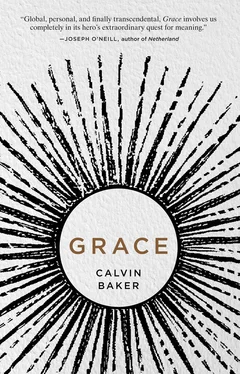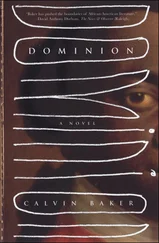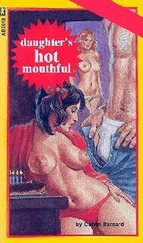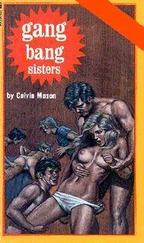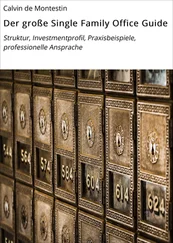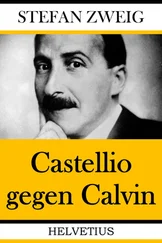“Only once,” I said.
All day we had tried to make the best of it, but as the buildings on lower Broadway focused the wind into a tunnel, and the snow pelted our faces, I told her how sorry I was for my lack of patience in insisting we return.
“I forgive you,” she said. “But we could have done it my way too, you know, and stayed put.”
My building was in sight by then, and we pressed into the warm sanctum of the lobby, and were home.
We left our luggage in the living room, found food in the refrigerator, and drank hot tea, before falling into a bone-deep sleep.
That night I dreamed I was climbing a great set of stone stairs carved from a cliff. At the summit was a lake, which I dove down until I nearly drowned, before emerging on the outskirts of a majestic, red-golden city. When I emerged in its castle I ascended into a vaulted room, and walked around until I came to a kitchen, where I saw my mother cooking. She was young in my dream and happy. I approached and she told me sit down and tell her what I had learned, as though I had just come home from school. The dream dissolved, and I awoke in the middle of the blue night as the tempest continued to rage outside.
I could not go back to sleep, and went to the kitchen for water. When I returned to bed Sylvie was awake. “You were right,” she said, the tempest outside beating against the glass. “It’s good we made it home.”
“No, you were right. We should have stayed where we were. The risk was not worth it.”
“But now we are safe and snug.” She nestled against me in the predawn and fell back asleep. I remained awake the rest of the night, but stayed in bed watching her sleep. When she woke we rose to make breakfast, then returned to bed where we spent the rest of the morning. By late afternoon the snow began easing up, and we went out to explore. The plows were out on the avenues, but the smaller streets were pristine with snow, and we made our way over to the Battery, and we followed the bike path along the Hudson before taking the subway up to Hell’s Kitchen, and then made our way across to Central Park. The edges of the park were full of people sledding, and making snow angels, but the interior was silent, and the tops of the buildings scarcely visible, so it felt like an otherworldly forest, as we crossed east and headed back downtown.
We walked down the middle of Fifth, quiet and still as a blanket of new wool. The lions outside the Met were frozen over in a clear sheet of ice, and the doormen guarded their posts in the cold, draped in greatcoats.
By the time we reached the southern edge of the park, we were shivering with cold, and decided to have drinks before heading home. There was life out front of one of the hotels, and we made our way toward it.
There was no one inside except a handful of young guests and their chaperones, all dressed up for a birthday party, looking worried no one would make it out in the weather.
We were seated in a window bay, looking out from our perch over the emptiness of the streets.
“Aren’t they just the best waiters in the world?” Sylvie asked, when our drinks arrived. “They are not playing at waiting. They are real, first-class waiters from a different time, when people knew to wait for things.”
“Which era was that?” I asked, and we played the game of choosing which epoch we would best like to live in, and drank our toddies, and decided it was the perfect time to be alive.
There were no cabs when we left, and it had begun to snow again, so we took the subway to Canal, which was barricaded, due to a blaze that had broken out in the apartment blocks along East Broadway, forcing us to walk through the snow-blanketed streets, which had turned to a wet, sooty slush.
As we trundled home the needles of swirling snow began to blind us, and everyone else around was coated in the falling flakes, which looked gentle where there was no wind but were ferociously sharp to the skin, reminding me of things that used to be.
Everyone’s eyes were asquint, with scarves pulled around their noses and mouths for protection, as we maneuvered the confusion of the barricades, wondering which way to go. We clasped hands in commiseration, then shoved them in our pockets for warmth, nodding sympathetically at passersby who did the same, everyone afraid and confused and anxious to get home.
A water main had burst on Chambers, sheeting the street in ice, and snapping over the few spindly trees, forcing us to double back again with the crowd, willy-nilly out toward the river, as the ghostly snow fell over us.
Sylvie tucked against my shoulder and we leaned into the howling onslaught, miserable and frozen to the core, and it felt we would never be warm.
I was too cold to talk, but when we reached John Street I thought to get some groceries, so that we would not be forced to leave the house the next day.
The shelves were empty, and the cashiers stared at the flashing television screen for information, wondering how they would get home at the end of their shift. They looked like they had not slept at all, scanning the screens anxiously for information. The announcers in their hyperbole kept calling it the Storm of the Century, but had no more information than that, except that there was no longer train service, and no more taxis, and nothing moving into or out of or through the city at all.
“Look, you’re all covered,” Mr. Lee said when we entered, handing us towels. We thanked him and asked how they were faring. “We all slept at the store last night,” he answered. “We may be here again. But we have food at least.”
We got what we could from the shelves, and stepped back out into the whipping gusts, until we finally reached the heat of the lobby, where we felt safe. The power in the building was out, so we climbed the stairs to the apartment. There was gas, so we made hot chocolate and lit candles and camped around the kitchen table.
It was still snowing the next morning, leaving the city frozen as the final ice age, and even the hum of white noise had disappeared into true silence, with nothing but winter all around.
“Look how easily even New York is made fragile,” Sylvie commented, looking down on the frozen city. “Just imagine what happens when a storm lands, or a drone strikes, in some place still half-made or half-defeated from being taken over.”
We stayed the next day in bed, under the comforter, reading to each other out loud, and only left the warm covers in the evening to cook.
“I will make dinner,” I said, going off to the kitchen. “Is there anything in particular you want?”
“Whatever you’re in the mood for.”
“There is the roast we bought last night, and some parsnips.”
“It sounds like a fine winter meal, but a vegetable is also sometimes green. Why don’t we make a salad of the fennel?”
Outside the power had not been fully restored, but the yellow sodium lamps glowed on the frozen snow, and beyond there were little flickers of light coming from the windows of the buildings with generators; but mostly there was darkness, the world reduced to the size of my apartment and everything beyond distant and meaningless.
“You know what this reminds me of?” she asked.
“Yes,” I said.
“Were you here?”
“Yes.”
“Me too.”
She did not say anything else for a long time after that, but simply stared out over Lower Manhattan into the storm. “You know, there are kids in grade school now who were not even alive then.”
“Time moves so fast.”
“And if we have children they will never know what it felt like here then. They won’t know what it was like before, at all.”
“Before the murders.”
“I did not know you could be like that.”
“Like what?”
Читать дальше
